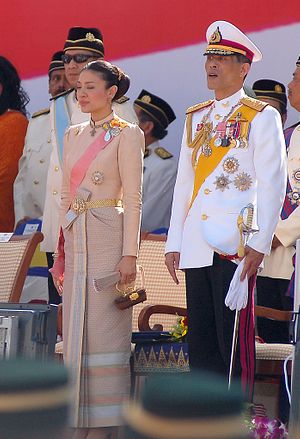Last week, the head of the royal police security unit made some headlines when he offered another data point in a perceived ongoing effort to strengthen security around Thailand’s new king. While there is still much in the way of uncertainty about the country’s new monarch and the balance of power among political forces in the Southeast Asian state, it nonetheless put the focus on one aspect of the monarchy’s significance in this broader context.
As I have observed before, the monarchy in Thailand has long had its own dedicated security personnel. This link is rooted in general ties between the military and the monarchy – evident today with Thailand being a constitutional monarchy governed by a military – as well as more specific manifestations of this such as regiments within the Thai military and security forces being dedicated to the protection of the royal family under the labels of the King’s Guard and Queen’s Guard (See: “The New Thai King’s Volunteer Army”).
This has continued under Thailand’s new king, Maha Vajiralongkorn, as he seeks to consolidate his power following his father’s passing in October 2016. Amid the focus on his consolidation of power, there has been increased scrutiny on some specific aspects that are not entirely new developments with respect to the monarchy, be it the recruitment of a volunteer army numbering in the millions or the efforts to strengthen security forces around the king.
Last week, we saw the focus on another data point of the security around the Thai king. Torsak Sukvimol, the newly-appointed head of the Special Service Division, told Agence-France-Presse on October 5 that while it currently has 400 personnel from the Crime Suppression Division that has long been tasked with protecting the royal family, the total allocated staff will be 1,617 in total.
At a general level, Torsak’s comments are not entirely surprising. As noted previously, there have been efforts at play to reinforce the security around the Thai king as part of the ongoing transition to the monarchy. Some of these efforts have often been hyped in the context of a broader focus on Vajiralongkorn’s efforts to strengthen his own power independent of the military, as evidenced by developments such as when he ordered revisions made to the military-drafted constitution last year.
At a more specific level, it is also difficult to assess what exactly this rising security force actually means. For instance, while the headline figure of 1,617 suggests a huge quadrupling of the initial force of around 400 personnel, Torsak also mentioned that recruiting and training of the officers could take up to five years, suggesting that the increase may in fact be more gradual.
There were also unsurprisingly few specifics offered on what the exact balance of responsibilities that this force would be. Torsak generally characterized the function of the security detail as overseeing ten subdivisions including a range of areas such as “conduct intelligence” and “police patrolling.” But the real roles of this security force will be seen with the holding of royal events over the next year and beyond, including Vajiralongkorn’s expected coronation.
The focus on the security forces around Vajiralongkorn ought not to be understated – the monarchy remains a powerful institution in Thailand, and Vajiralongkorn himself is no stranger to power politics, having himself served in the King’s Guard when he was Crown Prince. That said, it is still early days in his reign, and the real impact of efforts such as a boost for its security force will likely only be felt as we see Thai politics evolve and concretize.
































